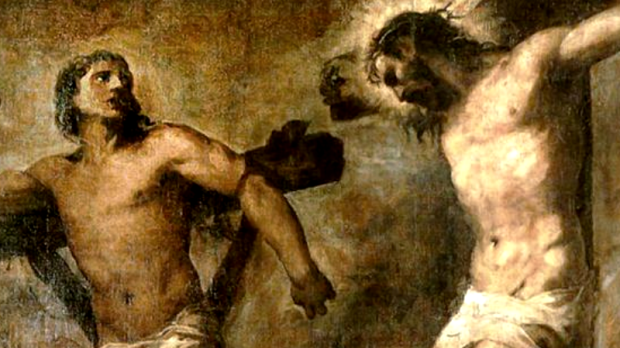Lenten Campaign 2025
This content is free of charge, as are all our articles.
Support us with a donation that is tax-deductible and enable us to continue to reach millions of readers.
We won’t understand what goodness means unless we take a closer look at the story of the Good Thief, the only individual to have been canonized by Jesus Himself. Of his life, we know almost nothing. St. Luke is the only evangelist to have reported the moving discussion that took place between Jesus and the two thieves (Lk 23, 39-43).
Who were these two men crucified together with Him? Were they common thieves or political agitators? No one knows, but what St. Luke tells us about them is enough to understand the essentials. Because we ignore his name and the nature of crimes committed by the Good Thief, he has, in a way, become the symbol of all robbers, bandits, and other “poor wretches”. Deep down, he represents all of us, even if we’ve committed no horrible crimes. But on this Good Friday, the Good Thief can help us understand the meaning of goodness…
From the depth of his misery, the Good Thief cried out to Jesus and placed his hope in him. This is what we are all asked to do – to place our hope in Christ, instead of our material and spiritual wealth.
The Good Thief teaches us to look to Jesus on the Cross. It is something we do not like to do. We are all tempted to skip Holy Friday, to get to Easter! Yet, we have no other source of goodness than Christ Crucified, no other path to sanctity than the Cross – the path of the Good Thief who was crucified like Jesus. All those rejecting the path of the Cross reject goodness and its unique source, Christ Crucified. In contemplating Jesus who died for our sins, we realize how great our need for mercy is. At the same time that He offers us salvation, Jesus opens to us the gates of his Kingdom.
Worse than being a sinner is refusing to acknowledge our sin
No matter the gravity of the sins we have committed, we have been destined for sanctity. All that Jesus is asking of us is to follow the path of the Good Thief. The latter had the courage to humbly recognize his sins, show his trust in the Lord, and ask for forgiveness. The sin in itself is not tragedy. Doubting forgiveness, as if Jesus didn’t die for sinners, is.
Refusing to acknowledge sin out of pride is worse than sinning. Neither should we ever believe ourselves to be righteous, because the righteous don’t need to be forgiven or for Jesus to die for them.You could be a good, pious, and charitable person but as long as you’re convinced of your own righteousness you cannot be truly righteous.
Christine Ponsard

